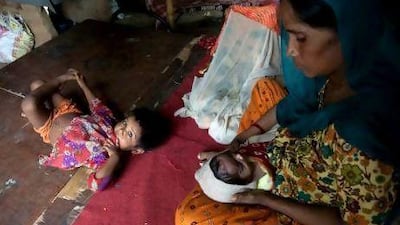JODHPUR // "We would much rather die than go back to Pakistan," said one of the 350 Pakistani Hindu refugees who have fled to Jodhpur in recent weeks.
Officials in the western Indian state of Rajasthan have reported an increase in Hindu refugees who claim they are fleeing persecution in Pakistan.
But Pakistani authorities say the numbers are exaggerated and that those who leave are economic migrants seeking better jobs.
"Our girls are not safe in Pakistan. In the recent past, there have been several cases of teenagers being kidnapped, raped and converted to Islam. There is nobody to help us there," said one of the migrants.
The refugees were initially lodged in a local temple, but as the numbers swelled it was impossible for them to continue to stay and they now live in tents.
"We are happy to be here, but we had been staying in just two rooms at the Dali Bai temple here," said Ramadas, one of the migrants. "We were asked to vacate, and then had just the sky for a roof. Some locals have erected tents for us."
Krishna, a 40-year-old female migrant, explained why Hindus were leaving Pakistan.
"We used to fear moving out of the house and stayed indoors. But even within the house, we were not safe as there were robbers who could just barge in and harass us."
There was no question of complaining to the authorities - that was inviting more trouble, she said.
On September 10, between 170 and 200 people arrived in Jodhpur by train. The influx is not a new phenomenon, according to estimates by Seemant Lok Sangathan (SLS), a group working with refugees in Rajasthan. More than 100,000 Hindu migrants from Pakistan have been living in the state since 1971.
About 13,000 Pakistani Hindus were granted Indian citizenship by 2005-06. Many more have received long-stay visas.
Chetandas, a 45-year-old refugee said there was just no political will in Pakistan to help Hindu minorities. "If Hindu families are provided a visa easily, no one would stay in Pakistan. We were among the lucky few to get a visa. Ever since reports have appeared that many Hindus are leaving Pakistan, authorities are more stringent about giving visas."
Hindu Singh Sodha, social activist and head of SLS, said that the Indian government needs to evaluate how it deals with the refugees.
"We have urged the central government to introduce a proper policy and law for the refugees," he said.
Rajasthan chief minister, Ashok Gehlot, met some of the group and promised to seek assistance from national authorities.
"The chief minister will extend all possible help to Pakistani members who have arrived here and will take the matter up with the government for their rehabilitation," Mr Gehlot's spokesman said.
Om Prakash Lakhawat, a senior Bharatiya Janata Party (BJP) leader in Rajasthan, met the refugees yesterday and said that everything would be done to offer proper accommodation and other facilities to them.
Arjun Ram Meghwal, a BJP MP from Bikaner, who also met the migrants yesterday, said that the process of offering them citizenship would be expedited. The Pakistani Hindus have approached the Indian government asking to be granted official refugee status.
"Hindus are suffering social and religious persecution in Pakistan," Chetan Ram, 39, a leader of the refugees said last week.
"My wife, mother and family are with me and we will not return to Pakistan whatever the living conditions are in India."
In August, about 200 Pakistani Hindus crossed into India after the kidnapping of a Hindu girl in Pakistan's Sindh province.
Forced marriages of their women and security issues have emerged as major concerns for Pakistani Hindus, according to a Pakistani government report formed by the president, Asif Ali Zardari.
The head of the commission, Maula Bux Chandio, said the issue was not as serious as was being portrayed in the media. But he acknowledged that Hindus suffered from a sense of deprivation.

